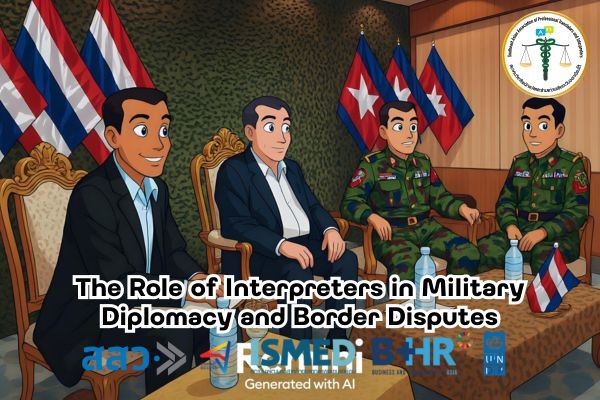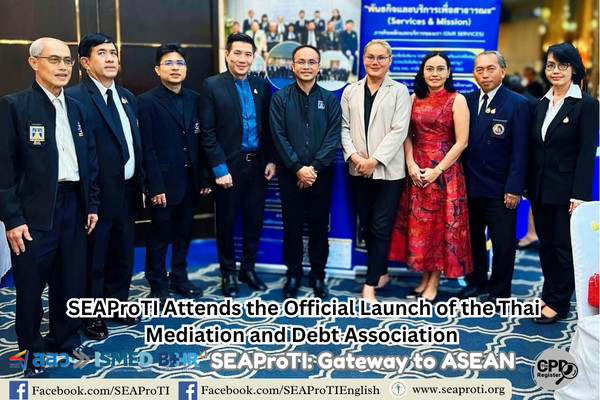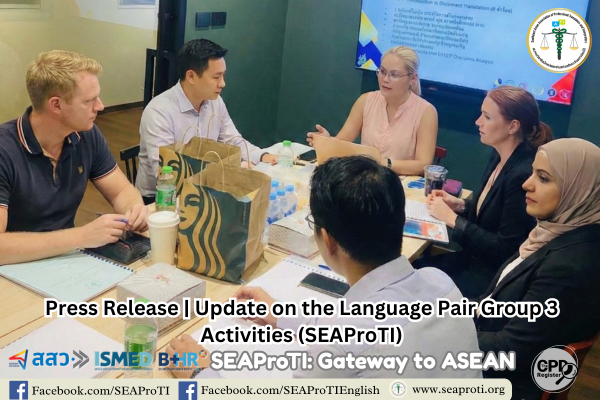The Role of Interpreters in Military Diplomacy and Border Disputes:
Legal Frameworks, Professional Ethics, and Development Pathways
5 June 2025, Bangkok – In the realm of international security and diplomacy, the most powerful voice is not always that of a defense minister or a military commander. Often, it is the voice of the interpreter who accurately conveys every word across linguistic and cultural boundaries. In military settings, interpreters are more than just language professionals; they must also possess a deep understanding of national security contexts, political sensitivities, and professional ethics. This article explores the roles, regulations, and development pathways for interpreters working in security-related missions, particularly in military diplomacy and international border disputes.
Ministry of Defense Regulations on the Use of Interpreters
Thailand’s Ministry of Defense has clear guidelines regarding the use of interpreters, distinguishing between in-house personnel and external professionals. In-house interpreters are typically officers from units such as the Directorate of Intelligence, Foreign Affairs Division, or Command and General Staff College. These individuals receive specialized language training to serve in official meetings, joint military exercises, diplomatic receptions, and other international engagements.
When qualified in-house interpreters are unavailable, the Ministry may hire external freelance interpreters or subject-matter experts under government procurement regulations. Compensation for such interpreters is determined by the Ministry of Finance’s official rates and may vary based on qualifications, experience, and mission complexity. For high-risk or high-level assignments, such as international negotiations or security agreements, higher compensation may be approved based on specific government directives.
Interpreters in Military Diplomacy
Military diplomacy is a key domain where interpreters play a pivotal role. They are essential in bilateral or multilateral meetings between Thailand’s armed forces and foreign counterparts, the negotiation of security agreements or MOUs, and participation in committees such as the Joint Border Committee (JBC) or General Border Committee (GBC), particularly with neighboring countries like Cambodia, Myanmar, and Malaysia.
Military interpreters must not only be proficient in English or relevant local languages but also understand the cultural, political, and diplomatic contexts in which communication occurs. The ability to regulate tone, filter sensitive content, and maintain composure under pressure is critical, as these missions often involve matters of national interest.
Ethics of Interpreting in International Dispute Contexts
Interpreting during border disputes or military negotiations demands a high level of professional responsibility. Interpreters must strictly adhere to professional ethics, including neutrality (no bias or partisanship), confidentiality (no disclosure of information), and accuracy (faithful and complete rendering without distortion). They must also be aware that their interpretations can have direct impacts on international relations and national security.
These ethical standards align with codes of conduct established by professional organizations such as the Southeast Asian Association of Professional Translators and Interpreters (SEAProTI), the International Association of Conference Interpreters (AIIC), and the International Federation of Translators (FIT), all of which emphasize ethical discipline even in highly specialized contexts like military or diplomatic missions.
The Interpreter’s Role in Border Disputes Before International Courts
When border disputes cannot be resolved diplomatically and proceed to international adjudication—such as the International Court of Justice (ICJ) or the Permanent Court of Arbitration—interpreters play critical roles in translating historical documents, treaties, and maps, as well as providing oral interpretation during hearings, witness examinations, and public statements.
A notable example is the Preah Vihear dispute, where interpreters were involved in translating historical maps and legal arguments with high precision. In such contexts, interpreters are not merely language conveyors but integral participants in international legal procedures.
Interpreters in Joint Border Committee Coordination
At the regional and local levels, interpreters also assist in meetings of provincial Joint Border Committees or task forces in disputed territories. Their responsibilities include field interpretation during site inspections, simultaneous or consecutive interpretation at headquarters meetings, and preparation of official bilingual reports.
Development Strategies for Military and Diplomatic Interpreting in Thailand
To enhance national security through diplomatic mechanisms, Thailand’s Ministry of Defense and related agencies should adopt comprehensive strategies for interpreter development. These include:
Specialized interpreter training through military institutions such as the Command and General Staff College, or via partnerships with professional associations like SEAProTI;
- Creation of a national database of qualified interpreters for border and dispute missions;
- Formulation of a dedicated code of ethics tailored to military and diplomatic interpreting.
- Implementation of a professional certification system, such as the Certified Military Interpreter (CMI), to standardize qualifications and ensure interpreter readiness for high-stakes assignments.
In a world where conflict can arise from a single miscommunication, the voice of a knowledgeable, principled interpreter may be the bridge between peace and escalation. Their role in national security dialogues should not be underestimated, and their development should be a key element of Thailand’s long-term security policy.
SEAProTI’s certified translators, translation certification providers, and certified interpreters:
The Southeast Asian Association of Professional Translators and Interpreters (SEAProTI) has officially announced the criteria and qualifications for individuals to register as “Certified Translators,” “Translation Certification Providers,” and “Certified Interpreters” under the association’s regulations. These guidelines are detailed in Sections 9 and 10 of the Royal Thai Government Gazette, issued by the Secretariat of the Cabinet under the Office of the Prime Minister of the Kingdom of Thailand, dated July 25, 2024, Volume 141, Part 66 Ng, Page 100.
To read the full publication, visit: the Royal Thai Government Gazette
บทบาทของล่ามในภารกิจทูตทางทหารและข้อพิพาทชายแดน: กรอบกฎหมาย จรรยาบรรณ และแนวทางการพัฒนา
5 มิถุนายน 2568, กรุงเทพมหานคร – ในบริบทของความมั่นคงและการทูตระหว่างประเทศ เสียงที่ทรงพลังมิใช่เพียงเสียงของรัฐมนตรีกลาโหมหรือแม่ทัพใหญ่ แต่คือเสียงของ “ล่าม” ผู้ถ่ายทอดสารอย่างเที่ยงตรงจากภาษาหนึ่งสู่อีกภาษาหนึ่ง เพื่อรักษาความเข้าใจร่วมกันท่ามกลางความแตกต่างทางภาษาและวัฒนธรรม ล่ามในบริบททหารจึงไม่ใช่เพียงผู้มีทักษะด้านภาษา หากแต่ต้องเป็นผู้เข้าใจบริบทความมั่นคง ความละเอียดอ่อนทางการเมือง และมีจรรยาบรรณอันเคร่งครัด บทความนี้จะสำรวจบทบาท กฎระเบียบ และแนวทางการพัฒนาล่ามในภารกิจด้านความมั่นคง โดยเฉพาะในการเจรจาชายแดนและข้อพิพาทระหว่างประเทศ
ระเบียบของกระทรวงกลาโหมไทยเกี่ยวกับการใช้ล่าม
กระทรวงกลาโหมไทยได้กำหนดระเบียบที่ชัดเจนในการใช้ล่าม แบ่งออกเป็นสองกลุ่มหลัก ได้แก่ ล่ามประจำที่เป็นข้าราชการในสังกัด และล่ามภายนอกซึ่งจัดจ้างเป็นกรณีพิเศษ ล่ามประจำมักสังกัดกรมข่าวทหาร กองการต่างประเทศ หรือโรงเรียนเสนาธิการทหาร และจะได้รับการฝึกอบรมด้านภาษาโดยเฉพาะ เพื่อปฏิบัติหน้าที่ล่ามในงานประชุม การฝึกผสม การเยือนทางการทูต หรือกิจกรรมที่เกี่ยวข้องกับคณะต่างประเทศ ส่วนการใช้ล่ามภายนอกสามารถกระทำได้เมื่อไม่มีบุคลากรในสังกัดที่เหมาะสม โดยจะพิจารณาจัดจ้างตามระเบียบการจัดจ้างภาครัฐและประกาศอัตราค่าป่วยการจากกระทรวงการคลัง ทั้งนี้ ภารกิจที่มีลักษณะเสี่ยงหรือมีนัยสำคัญระดับชาติ เช่น การเจรจาชายแดนหรือความร่วมมือด้านความมั่นคง อาจได้รับการพิจารณาอัตราค่าตอบแทนพิเศษตามภารกิจ
ล่ามกับภารกิจทูตทหาร
ภารกิจทูตทางทหาร (Military Diplomacy) เป็นพื้นที่ที่ล่ามมีบทบาทอย่างยิ่ง โดยเฉพาะในการประชุมร่วมระหว่างกองทัพไทยกับประเทศเพื่อนบ้าน การลงนามข้อตกลงความร่วมมือด้านความมั่นคง หรือการประชุมในระดับคณะกรรมการชายแดนร่วม (Joint Border Committee – JBC) และคณะกรรมการชายแดนทั่วไป (General Border Committee – GBC) เช่น ไทย-กัมพูชา ไทย-เมียนมา และไทย-มาเลเซีย ล่ามในบริบทนี้ไม่เพียงต้องเชี่ยวชาญภาษาอังกฤษหรือภาษาท้องถิ่นของประเทศคู่เจรจา แต่ต้องเข้าใจบริบททางวัฒนธรรม การเมือง และความสัมพันธ์ระหว่างประเทศ ทั้งนี้ ความสามารถในการควบคุมอารมณ์และการกรองถ้อยคำให้เหมาะสมกับสถานการณ์เป็นสิ่งสำคัญอย่างยิ่ง เนื่องจากเนื้อหาของการเจรจามักเกี่ยวข้องกับผลประโยชน์ระดับรัฐ
จรรยาบรรณของล่ามในบริบทข้อพิพาทระหว่างประเทศ
การแปลในบริบทของข้อพิพาทชายแดนถือเป็นภารกิจที่ต้องอาศัยความรับผิดชอบทางวิชาชีพขั้นสูง ล่ามจะต้องยึดถือหลักจรรยาบรรณที่เคร่งครัด เช่น ความเป็นกลาง (Neutrality) ซึ่งห้ามแสดงความลำเอียงหรือมีท่าทีเข้าข้างฝ่ายใด ความถูกต้อง (Accuracy) ที่ต้องแปลเนื้อหาอย่างซื่อตรงโดยไม่บิดเบือน การรักษาความลับ (Confidentiality) ที่ห้ามเผยแพร่หรือเล่าขานเนื้อหาการเจรจาต่อบุคคลภายนอก และการตระหนักถึงผลของคำแปลต่อความสัมพันธ์ระหว่างประเทศและความมั่นคงของชาติ ทั้งนี้ จรรยาบรรณดังกล่าวสอดคล้องกับแนวทางที่กำหนดโดยองค์กรวิชาชีพ เช่น สมาคมวิชาชีพนักแปลและล่ามแห่งเอเชียตะวันออกเฉียงใต้ (SEAProTI), สมาคมผู้ล่ามการประชุมสากล (AIIC) และสหพันธ์นักแปลนานาชาติ (FIT)
บทบาทของล่ามในข้อพิพาทชายแดนที่อาจเข้าสู่กระบวนการยุติธรรมระหว่างประเทศ
ในกรณีที่ข้อพิพาทชายแดนไม่สามารถยุติได้ด้วยการเจรจาและเข้าสู่เวทียุติธรรมระหว่างประเทศ เช่น ศาลยุติธรรมระหว่างประเทศ (International Court of Justice – ICJ) หรือคณะอนุญาโตตุลาการถาวร ล่ามจะมีบทบาททั้งในการแปลเอกสารทางประวัติศาสตร์ แผนที่ หรือสนธิสัญญา ตลอดจนการแปลแบบปากเปล่าในการประชุม การสืบพยาน หรือการแถลงการณ์ต่อศาล ตัวอย่างสำคัญคือ กรณีข้อพิพาทเขาพระวิหาร ซึ่งล่ามมีบทบาทในการแปลเอกสารแผนที่โบราณและสำนวนทางกฎหมายที่มีความละเอียดอ่อนสูง ล่ามในกระบวนการเหล่านี้จึงไม่ใช่เพียงผู้แปลภาษา แต่เป็นส่วนหนึ่งของกลไกการสื่อสารในกระบวนการยุติธรรมระหว่างประเทศ
ล่ามกับการประสานงานคณะกรรมการชายแดนร่วม
ในระดับภูมิภาคและท้องถิ่น ล่ามยังมีบทบาทสำคัญในการประชุมของคณะกรรมการชายแดนร่วมระดับจังหวัด หรือหน่วยเฉพาะกิจชายแดน โดยเฉพาะในพื้นที่ที่มีความไม่แน่นอนเรื่องเส้นเขตแดน ล่ามจะต้องทำหน้าที่แปลภาคสนามระหว่างการตรวจพื้นที่ แปลเนื้อหาการประชุมสรุป ณ หน่วยบัญชาการ ตลอดจนจัดทำรายงานผลการเจรจาอย่างเป็นทางการทั้งภาษาไทยและภาษาต่างประเทศ
แนวทางการพัฒนาระบบล่ามทูตทางทหารในประเทศไทย
เพื่อเสริมสร้างความมั่นคงผ่านกลไกทางการทูต กระทรวงกลาโหมและหน่วยงานที่เกี่ยวข้องควรกำหนดแนวทางพัฒนาอย่างเป็นระบบ ได้แก่ การฝึกอบรมล่ามทหารเฉพาะด้านผ่านสถาบันที่มีความเชี่ยวชาญ เช่น โรงเรียนเสนาธิการทหาร หรือความร่วมมือกับสมาคมวิชาชีพ เช่น SEAProTI การจัดทำฐานข้อมูลล่ามเฉพาะทางเพื่อใช้ในภารกิจชายแดน การกำหนดจรรยาบรรณเฉพาะสำหรับภารกิจทางทูตและความมั่นคง ตลอดจนการผลักดันให้มีระบบการรับรองวิชาชีพ เช่น Certified Military Interpreter (CMI) ซึ่งสามารถใช้เป็นมาตรฐานในการคัดเลือกและประเมินคุณภาพล่ามในบริบทด้านความมั่นคง
ในโลกที่ความขัดแย้งสามารถปะทุจากความเข้าใจผิดเพียงเล็กน้อย เสียงของล่ามผู้เปี่ยมด้วยความรู้ ความเข้าใจ และจริยธรรม คือเส้นบาง ๆ ที่เชื่อมโยงสันติภาพกับความขัดแย้ง บทบาทของพวกเขาในเวทีความมั่นคงจึงไม่อาจมองข้ามได้ และยิ่งควรได้รับการส่งเสริมอย่างเป็นระบบในนโยบายความมั่นคงของชาติ
เกี่ยวกับนักแปลรับรอง ผู้รับรองการแปล และล่ามรับรองของสมาคมวิชาชีพนักแปลและล่ามแห่งเอเชียตะวันออกเฉียงใต้
สมาคมวิชาชีพนักแปลและล่ามแห่งเอเชียตะวันออกเฉียงใต้ (SEAProTI) ได้ประกาศหลักเกณฑ์และคุณสมบัติผู้ที่ขึ้นทะเบียนเป็น “นักแปลรับรอง (Certified Translators) และผู้รับรองการแปล (Translation Certification Providers) และล่ามรับรอง (Certified Interpreters)” ของสมาคม หมวดที่ 9 และหมวดที่ 10 ในราชกิจจานุเบกษา ของสำนักเลขาธิการคณะรัฐมนตรี ในสำนักนายกรัฐมนตรี แห่งราชอาณาจักรไทย ลงวันที่ 25 ก.ค. 2567 เล่มที่ 141 ตอนที่ 66 ง หน้า 100 อ่านฉบับเต็มได้ที่: นักแปลรับรอง ผู้รับรองการแปล และล่ามรับรอง
























